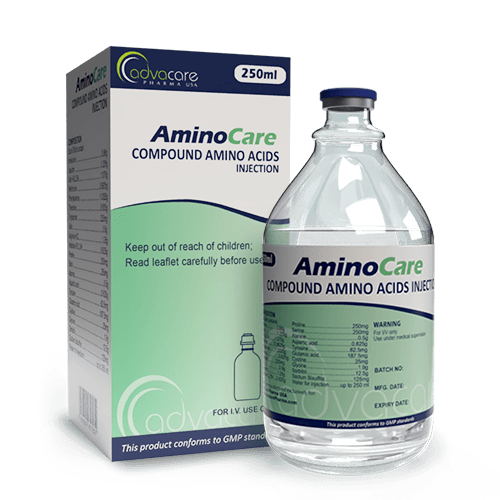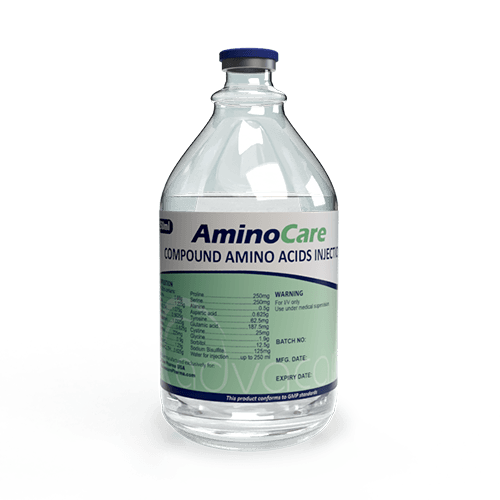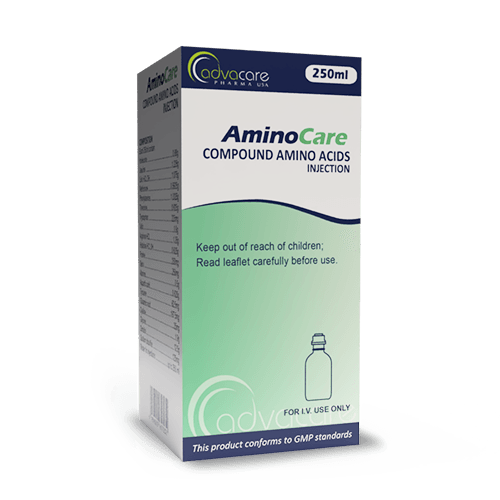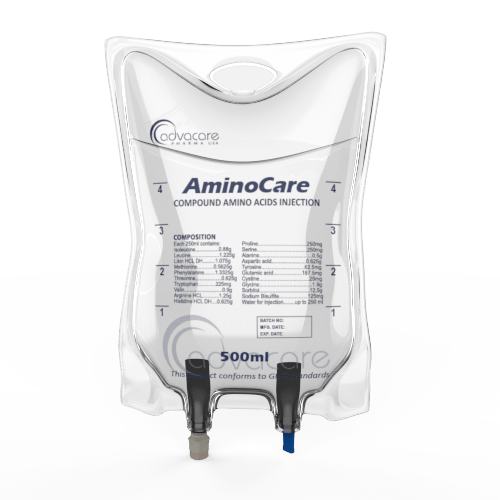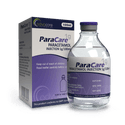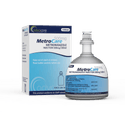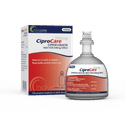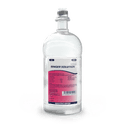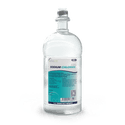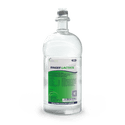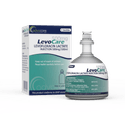- Home›
- Pharmaceuticals›
- Injections›
- Large Volume Injections›
- Compound Amino Acids Injection
Compound Amino Acids Injection
Dosage
Packaging
What is Compound Amino Acids Injection?
Active Ingredients: Lysine Acetate, Leucine, Phenylalanine, Valine, Isoleucine, Methionine, Threonine, Tryptophan, Alanine, Arginine, Glycine, Histidine, Proline, Glutamic Acids, Serine, Aspartic Acids, Tyrosine
Compound Amino Acids Injection is a sterile, non-pyrogenic hypertonic solution formulated to provide essential and non-essential amino acids to patients who cannot receive oral or enteral nutrition, making it a crucial component of parenteral nutrition. This medication may be administered alone or with other medications, such as glucose or fat emulsion.
This solution can promote protein synthesis and wound healing and can reduce the rate of endogenous protein catabolism. When given in combination with electrolytes, vitamins, trace metals, and dextrose, amino acids can constitute the total parenteral nutrition.
This Injection has been manufactured as a single-dose container for intravenous administration.
Compound Amino Acids are also available in the form of supplements.
AdvaCare Pharma is a global supplier and producer of Compound Amino Acids Injection. This medicine is produced in our GMP-certified facilities in China, India, and the USA. We routinely inspect our manufacturing facilities to ensure our products meet health, safety, and environmental standards.
Why are we a quality Compound Amino Acids Injection manufacturer?
AdvaCare Pharma is a leading manufacturer of Compound Amino Acids Injection. For 20 years, we have been in the business of manufacturing GMP-approved high-quality, affordable pharmaceutical injection products to improve healthcare worldwide. Our control of the supply chain is data-driven and methodical, supported by highly skilled teams of professionals.
As a large-scale Compound Amino Acids manufacturer, we supply pharmaceutical distributors, hospitals, pharmacies and other medical organizations in more than 65 countries.
Uses
What is Compound Amino Acids used for?
It is used as a source of essential and non-essential amino acids for patients who cannot receive oral or enteral nutrition, making it a crucial component of parenteral nutrition. This injection is a source of nitrogen and nutritional support for patients with adequate stores of body fat. If oral nutrition cannot be tolerated, this injection is recommended. It can preserve protein and reduce catabolism in stress conditions if oral intake is not adequate.
How should Compound Amino Acids Injection be used?
This medication is manufactured as a solution, which should only be administered by a doctor or healthcare provider.
What dose should be given?
Refer to a doctor or pharmacist for guidelines on dosage. Do not exceed what they advise.
Can Compound Amino Acids be given to pregnant women?
This injection belongs to the pregnancy category C, and no animal reproduction studies have been conducted with this drug. It is unknown if this injection can lead to fetal harm when administered to pregnant women. It is also unknown if this injection can affect the reproduction capacity. In pregnant women, this injection should be added only when clearly needed.
Can Compound Amino Acids be given to breastfeeding women?
There are no studies that confirm the safety of Compound Amino Acids in breastfeeding women. This injection should be used with caution in lactating women.
Can Compound Amino Acids be given to geriatric patients?
There are no clinical studies that prove the safety of this product for patients over 65 years of age. However, reported clinical experiences indicate no significant differences in responses between elderly and younger patients. When considering dose selection for elderly patients, caution is advised due to the higher prevalence of decreased hepatic, renal, or cardiac function, as well as concomitant diseases or other drug therapies. This drug is predominantly excreted by the kidneys, and the risk of adverse reactions may be increased in patients with impaired renal function. Given that elderly patients are more likely to have reduced renal function, careful consideration should be given to dose selection, and monitoring renal function may be beneficial.
Can Compound Amino Acids be given to pediatric patients?
In terms of pediatric use, the safety and effectiveness of solutions in pediatric patients have not been firmly established. Pediatric requirements for parenteral nutrition are influenced by the infant's higher relative fluid needs and greater caloric demands per kilogram. A recommended approach is to administer amino acids at a 2.5% concentration. For most pediatric patients receiving intravenous nutrition, a suggested regimen includes 2.5 grams of amino acids per kilogram per day, along with dextrose alone or in combination with intravenous lipid calories ranging from 100 to 130 kcal per kilogram per day. In cases of malnutrition or stress, these requirements may be elevated.
In pediatric settings, it is acceptable to initiate with a nutritional solution at half strength, delivered at a rate of approximately 60 to 70 mL per kilogram per day. After 24 to 48 hours of administration, the volume and concentration of the solution can be gradually increased until the full-strength pediatric solution (amino acids and dextrose) is administered at a rate of 125 to 150 mL per kilogram per day. Electrolytes and vitamin supplements should be added as necessary, guided by careful monitoring of blood chemistry and nutritional status. Iron supplementation is particularly crucial for infants due to the growing red cell mass. Serum lipids need to be monitored to detect evidence of essential fatty acid deficiency in patients on fat-free TPN. Bicarbonate should not be administered unless absolutely necessary during the infusion of the nutritional solution.
To ensure precise delivery of the small fluid volumes required for total parenteral nutrition in infants, it is essential to use accurately calibrated and reliable infusion systems.
Other warnings
Intravenous administration of this injection may lead to increased blood urea nitrogen (BUN). It should be carefully administered, especially in patients with impaired hepatic or renal function. Patients that regularly take Compound Amino Acid Injection should be monitored carefully and the treatment process should be stopped if the BUN levels increase. Increased protein intake during the administration of this injection might lead to increased BUN.
The infusion of amino acid solutions in a patient with hepatic insufficiency can lead to disturbances in serum amino acid levels, metabolic alkalosis, prerenal azotemia, and hyperammonemia, and may manifest as stupor and coma.
When administering amino acid solutions to individuals with impaired renal function, it can contribute to an elevation in blood urea nitrogen (BUN), similar to the impact of any dietary protein component.
Caution should be exercised, or sodium ion-containing solutions should be avoided altogether in patients with congestive heart failure, severe renal insufficiency, and conditions characterized by edema with sodium retention. Similarly, solutions with potassium ions should be used with great care or avoided in individuals with hyperkalemia, severe renal failure, and situations involving potassium retention.
In cases of metabolic or respiratory alkalosis, solutions containing acetate ions should be administered with great care. Special attention is needed when using acetate in conditions where there is an elevated level or impaired utilization of this ion, such as severe hepatic insufficiency.
In infants, hyperammonemia can lead to mental retardation, underscoring the importance of frequent monitoring of blood ammonia levels. It is crucial to be vigilant for asymptomatic hyperammonemia, even in patients without apparent liver dysfunction, as underlying factors may include genetic defects and immature or subclinically impaired liver function.
Caution is advised when administering glucose for caloric provision in patients with diabetes or prediabetes. Feeding regimens containing amino acids should be approached carefully in patients with a history of renal disease, pulmonary disease, or cardiac insufficiency to prevent excessive fluid accumulation.
Monitoring nitrogen intake is crucial in patients with impaired renal function.
In cases of long-term total nutrition or when a patient lacks sufficient fat stores, it is crucial to concurrently provide ample exogenous calories along with amino acids. Concentrated dextrose solutions serve as an effective source of calories. Administration of strongly hypertonic nutrient solutions should be done through an indwelling intravenous catheter positioned in the superior vena cava.
During the administration of total parenteral nutrition, there is a constant risk of sepsis. It is crucial that the preparation of the solution and the placement and care of catheters be conducted under stringent aseptic conditions.
Following preparation, solutions should be promptly used, and it is imperative that the administration time for a single container and set does not exceed 24 hours to minimize the risk of complications.
Side Effects
As with all pharmaceuticals, some unwanted effects can occur from the use of Compound Amino Acids Injection.
Common side effects include, but may not be limited to:
- redness and pain at the injection site
- fever
- nausea
Serious side effects may include:
- shortness of breath
- sudden weight gain
- yellowing of the skin or eyes
- dark urine
- weakness
Compound Amino Acid administration has been associated with various metabolic complications, including metabolic acidosis and alkalosis, hypophosphatemia, hypocalcemia, osteoporosis, glycosuria, hyperglycemia, hyperosmolar nonketotic states, dehydration, rebound hypoglycemia, osmotic diuresis and dehydration, elevated liver enzymes, hypo- and hypervitaminosis, electrolyte imbalances, and hyperammonemia in pediatric patients. To prevent or minimize these complications, frequent evaluations, particularly during the initial days of therapy, are essential.
For a comprehensive understanding of all potential side effects, consult a medical professional.
If any symptoms persist or worsen, or you notice any other symptoms, please call your doctor immediately.
Precautions
Do NOT use Compound Amino Acids Injection if: • You have a medical history, including any kidney or liver disease, digestive disorders, bleeding problems, or any allergies.
This injection is not recommended for patients with a hepatic coma or metabolic disorders. It should not be used for patients with impaired nitrogen utilization.
Before treatment, consult your doctor regarding any medications you are taking to address potential drug interactions.
This medication may not be suitable for people with certain conditions, so it is important to consult with a doctor.
References
The Effects of Amino Acid Supplementation on Muscular Performance During Resistance Training Overreaching
This study investigated the impact of amino acid supplementation on muscular strength, power, and high-intensity endurance. The participants included 17 resistance-trained men, divided into a supplement group and a placebo group.
Muscle strength, power, and high-intensity endurance were measured before the study began and again at the end of each training week. The group that did not take amino acid supplements showed less improvement in training performance. In contrast, the group taking supplements maintained their power during intense training sessions.
These findings suggest that amino acid supplements can help prevent power loss during intense training, and can lead to better muscular strength and power.

You might be interested in...
Why AdvaCare Pharma?
As an industry leader, we are aware of our responsibility to provide affordable and sustainable solutions to improve healthcare worldwide.
